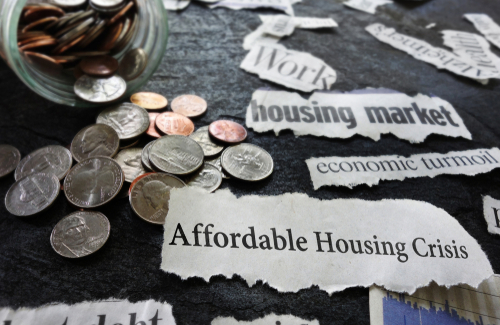
People looking for new places to live right now know just how poor the housing market is. Rent is high, home prices are high, and the supply of homes and rental properties is relatively low. This leaves many renters wondering–will rental rates go down soon? The affordable housing crisis is affecting many people across the country. Let’s go over some of the causes and how to navigate high rental rates during this time.
What is the Affordable Housing Crisis?
An affordable housing crisis occurs when there are insufficient affordable housing units and an uneven distribution of affordable housing units. Currently, our nation is experiencing an affordable housing crisis, and there are not enough affordable homes for low-income renters.

Housing is only considered affordable if it consumes less than 30% of a household’s income. With a lack of affordable housing, people experience more stress related to job stability, food prices, healthcare, etc.
As part of the affordable housing crisis, we are experiencing a housing shortage, so people are unable to purchase homes at a reasonable price. In addition, inflation has made it nearly impossible for first-time homebuyers and renters to live comfortably. After all, it’s difficult for anyone to find affordable housing with high rent prices and high home prices. Next, let’s go over what is causing the affordable housing crisis.
What Causes an Affordable Housing Crisis?
Our current affordable housing crisis is caused by several factors. For example, supply and demand, land-use regulations, and a lack of resources to create more housing are all factors in the crisis. Even more so, the COVID-19 pandemic has played a huge role in the shortage of affordable homes. Over the past year, we’ve witnessed home prices plummet and then skyrocket again once the supply becomes too low to keep up with the demand.
Unfortunately, we won’t solve the affordable housing crisis until we increase the supply or tend to the demand. However, it’s much easier said than done. It will take a lot of work and time for the crisis to work itself out. We also need help from government leaders to make it happen. Now, let’s go over what causes high rental rates that we’re experiencing today.
What’s Causing High Rental Rates?

Similar to the low supply and high demand for housing, the rental market is experiencing the same issues. Currently, rental rates are extremely high, and many renters can’t keep up. But why is this happening?
Many factors affect rental rates, such as:
- Low Inventory
- High Home Prices
- Effects from the Eviction Moratorium
- Increasing Demand
Low Inventory
Like the housing market, the rental market is experiencing a period of high demand and low inventory. With a lack of rental homes available, landlords can set competitive monthly rent prices for their properties. Typically, landlords will charge higher prices to keep up with other competitors.
Additionally, fewer people are leaving their current rentals because there’s a lack of available housing. As a result, landlords can increase prices for current tenants since they don’t have many options for alternative housing.
High Home Prices
It’s clear that home prices are much higher than in the past. That said, when home prices skyrocket, rent prices inevitably increase. This is because most landlords determine their rental rates based on the market value of their homes.
For example, if their rental property is worth $100,000, they may charge anywhere from $900 to $1,200 per month in rent. As the price of homes continues to increase, rent prices will follow.
Effects of the Eviction Moratorium
The Eviction Moratorium that occurred over the pandemic affected the rental market tremendously. One of the major changes during this time was that landlords were prohibited from evicting tenants due to nonpayment of rent.
Inevitably, this left landlords to pay mortgage payments, utilities, taxes, and other miscellaneous costs. As a result, many Northern Virginia property management companies have seen increased rental prices as landlords attempted to make up for losses. Although the moratorium ended a few months ago, landlords still feel the aftermath of losses.
Increasing Demand
Finally, the demand for housing in certain areas and certain demographics is another reason rental rates are so high right now. For example, age groups such as millennials and Baby Boomers are looking to live in low-maintenance places.
As a result, they are more likely to move into an easy-to-manage apartment or rental home. Most likely, this is because millennials want to focus more on their career and lifestyle, while Baby Boomers are reaching an age where full home maintenance is difficult.
Does Inflation Affect the Housing Market?

We all know that inflation is an increase in the prices of goods and services. But does it have any effect on the housing market and rental rates? Inflation has many effects on the housing market, both good and bad, depending on how you look at it.
For example, inflation is not terrible for landlords and homeowners since their properties will increase in value. However, inflation is bad for renters and prospective homebuyers because rates will become unaffordable.
Overall, inflation affects the housing market like anything else–prices continue to rise, and the purchasing power of money decreases.
Can Tenants Keep Up with High Rental Rates?
During this period of high rental rates and a lack of affordable housing, tenants have trouble keeping up with payments. Without anywhere else to go and rent taking up the majority of the middle-class workforce’s paychecks, it’s challenging for tenants to balance work, raising children, buying food, and managing stress.
Hopefully, the rates of inflation will go down, and the housing supply with catch up with the demand. That said, for this to happen, we may need to build more rental housing units across America. Here are a few tips for renters as they navigate these periods of high rental rates.
Do Your Research on the Housing Market
The first step in understanding why rent is so high is doing some research. Although it’s incredibly frustrating and seemingly hard to understand, it’s essential to look at the big picture. If you’re not a landlord or a real estate investor, it can be hard to put yourself in their shoes, but most rental owners’ hands are tied with this type of rental market.
Before you settle on a rental home, look at other comparable homes in the same area. Many landlords are pricing their rentals at competitive rates, so it’s essential to scope out all your options before deciding on one. Additionally, keeping up with the current housing market can give you an explanation and some peace of mind as to when things will start looking up.
Save Your Pennies

As current home prices are also exceptionally high, if you must live in a rental home before buying a house, that’s perfectly fine! However, while you live in a rental, start saving up to buy your first home. After all, rent prices are high, but home prices are even higher. Living a simpler lifestyle and saving more money than usual can put you in a good spot to eventually purchase a home.
Additionally, you can reach out to your landlord to see if there are any maintenance chores you can do to lower your monthly rent. For example, you can offer to shovel during the winter or mow the lawn during the summer for reduced rental rates. Of course, this may not always work out, but it doesn’t hurt to ask your landlord.
Takeaways for Rental Home Owners
Rental homeowners see a different side of the coin than tenants. However, prospective buyers may be able to relate to the inflated prices of homes. That said, keep these circumstances in mind while setting competitive rental prices. Additionally, if you need help managing your rental homes, consider hiring a top-notch rental management team like Bay Property Management Group.
Whether you need help with tenant screening, collecting rent payments, rental maintenance, and more, our services have you covered. Contact us today if you’re in need of rental management in Baltimore, Philadelphia, Northern Virginia, Washington DC, or other surrounding counties.
